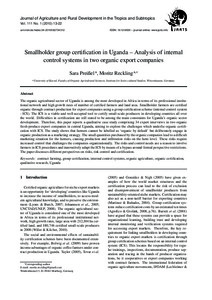Smallholder group certification in Uganda - Analysis of internal control systems in two organic export companies
| dc.date.accessioned | 2010-09-13T09:17:20Z | |
| dc.date.available | 2010-09-13T09:17:20Z | |
| dc.date.issued | 2010 | |
| dc.identifier.issn | 1612-9830 | |
| dc.identifier.uri | urn:nbn:de:hebis:34-2010082734312 | |
| dc.identifier.uri | http://hdl.handle.net/123456789/2010082734312 | |
| dc.language.iso | eng | |
| dc.publisher | Kassel University Press | eng |
| dc.rights | Urheberrechtlich geschützt | |
| dc.rights.uri | https://rightsstatements.org/page/InC/1.0/ | |
| dc.subject | Contract farming | eng |
| dc.subject | Group certification | eng |
| dc.subject | Internal control systems | eng |
| dc.subject | Organic agriculture | eng |
| dc.subject | Organic certification | eng |
| dc.subject | Qualitative research | eng |
| dc.subject | Uganda | eng |
| dc.subject.ddc | 630 | |
| dc.title | Smallholder group certification in Uganda - Analysis of internal control systems in two organic export companies | eng |
| dc.type | Aufsatz | |
| dcterms.abstract | The organic agricultural sector of Uganda is among the most developed in Africa in terms of its professional institutional network and high growth rates of number of certified farmers and land area. Smallholder farmers are certified organic through contract production for export companies using a group certification scheme (internal control system - ICS). The ICS is a viable and well-accepted tool to certify small-scale producers in developing countries all over the world. Difficulties in certification are still stated to be among the main constraints for Uganda’s organic sector development. Therefore, this paper reports a qualitative case study comprising 34 expert interviews in two organic fresh-produce export companies in central Uganda, aiming to explore the challenges which underlie organic certification with ICS. The study shows that farmers cannot be labelled as ‘organic by default’ but deliberately engage in organic production as a marketing strategy. The small quantities purchased by the organic companies lead to a difficult marketing situation for the farmers, causing production and infiltration risks on the farm level. These risks require increased control that challenges the companies organizationally. The risks and control needs are a reason to involve farmers in ICS procedures and innovatively adapt the ICS by means of a bypass around formal perspective restrictions. The paper discusses different perspectives on risks, risk control and certification. | eng |
| dcterms.accessRights | open access | |
| dcterms.bibliographicCitation | In: Journal of Agriculture and Rural Development in the Tropics and Subtropics. Kassel : Kassel University Press. - Vol. 111, No. 1 (2010), S. 13-22 | |
| dcterms.creator | Preißel, Sara | |
| dcterms.creator | Reckling, Moritz | |
| dc.description.everything | Gedruckte Ausg. im Verlag Kassel Univ. Press (www.upress.uni-kassel.de) erschienen. | ger |

